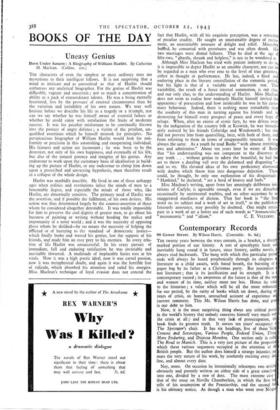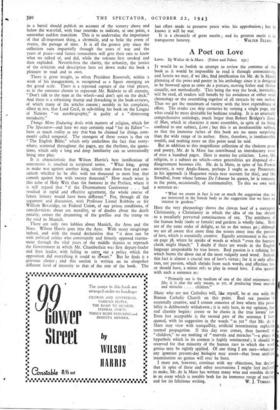Contemporary Records
99 Gower Street. By Wilson Harris. (Constable. 8s. -6d.) THE twenty years between the wars contain, in a bracket, a sharp marked portion of our history. A sort of apocalyptic hush w inevitably hang round it in future, since history, unlike novels, always read backwards. The bang with which this particular pen ends will always be heard prophetically through its chapters literature as a child awaits, with bated breath, the bursting of paper bag by its father at a Christmas party. But journalism not literature ; that is its justification and its strength. It is contemporary record ; its awareness of the future is that of the m and women of its time, neither more nor less. Hence its val to the historian ; a value which will be all the more enhance for our period, by the rarity of books which set down, during t years of crisis, an honest, untouched account of experience current comment. This Mr. Wilson Harris has done, and gr is our debt to him.
Now, it is the most surprising thing about any critical pert in the world's history that nobody concerns himself very much w the crisis at all ; and in that very lack of preoccupation, book finds its greatest truth. It covers ten years' occupancy The Spectator's chair. It has six headings, five of them 'be' Crowns and Sovereigns, Various People, Federal Union, Thin More Enduring, and Disjecta Membra. One section only is call The Road to Munich. This is a very just picture of the proport which these various sequences occupied in the attention of British people. But the author does himself a strange injustice, a mars the very nature of his work, by resolutely excising every line, and almost every date.
Nay, more. On occasion he intentionally telescopes two artic obviously and patently written on either side of a great catacly
into one, divided by a row of dots. The most extreme case that of the essay on Neville Chamberlain, in which the first h tells of his assumption of the Premiership, and the second is his obituary notice, As though a man who went over Niag
in a barrel should publish an account of the scenery above and below the waterfall, with four asterisks to indicate, at one point, a somewhat sudden transition. This is to undervalue the importance of that all-important thing, a chronicle, and to belie the event of events, the passage of time. It is all the greater pity since the collection runs impartially through the years of war and the years of peace—and future researchers will give their ears to know what we talked of, and did, while the volcano first smoked and then exploded. Nevertheless the clarity, the urbanity, the justice of the criticism and description here set down make the book a pleasure to read and to own.
There is great insight, as when President Roosevelt, within a week of his inauguration, is recognised as a figure emerging on the grand scale. There is a repeated capture of the vital phrase, as in the sentence chosen to represent Mr. Baldwin to all eternity, " Don't talk to the man at the wheel—and don't spit on the deck." And there is a refreshing thump and thwacking in the book-reviews, of which many of the articles consist ; notably in his complaint, albeit in jest, that Lord Cecil, in sub-titling his book on the League of Nations " an autobiography," is guilty of a " distressing mendacity."
Things More Enduring deals with matters of religion, which for The Spectator—and here we may certainly read " for its Editor "- have as much reality as any that *can be claimed for things com- monly called temporal. The strongest of these essays is that on " The English Bible," which only underlines the fact that every- where, scattered throughout the pages, are the rhythms, the quota- tions, which only a long and deep familiarity can so unstrainedly bring into play.-
It is characteristic that Wilson Harris's best justification of armaments is couched in scriptural terms. " What king, going to make war against another king, sitteth not down first and con- sulteth whether he be able with ten thousand to meet him that cometh against him with twenty thousand." How much wiser is this echo of Holy Writ than the footnote in the Preface, where it is still argued that "if the Disarmament Conference . . . had resulted in rapid and effective agreement, the whole course of future history would have been different." For, through all the argument and discussion, with Professor Lionel Robbins or Sir William Beveridge, on Federal Union, of our prison conditions, of considerations about sex morality, or of doubts about the death penalty, comes the drumming of the gorillas and the tramp on the road to Munich.
There are only two lobbies about Munich, the Ayes and the Noes. Wilson Harris goes into the Ayes. With many misgivings indeed, and with the round declaration that " it does not lie with political critics who consistently and bitterly opposed rearma- ment through the vital years of the middle thirties to reproach the Government in which Mr. Chamberlain was first deputy-leader and then leader, with failing to carry out a policy_ which the opposition did everything it could to thwart." But he finds it a grievous choice ; and this section is written on an altogether different level of intensity to that of the rest of the book. The last effort made to preserve peace wins his approbation ; but he knows it will be war.
It is a chronicle of great merits ; and its greatest merit is its



























 Previous page
Previous page